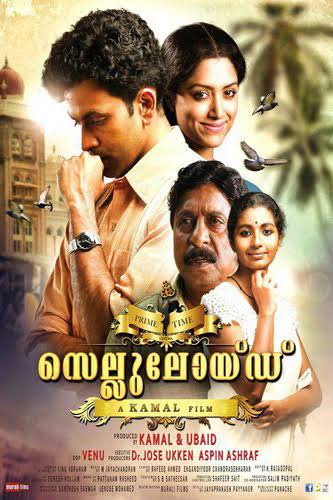Celluloid
The great Dadasasheb Phalke is known as “Father of Indian Cinema”, but do you know about J.C.Daniel ? Many people don’t, and even I didn’t before I watched Celluloid. J.C. Daniel is recognized as “Father of Malayalam Cinema”. Joseph Chellayya Daniel Nadar (28 November 1900 – 27 April 1975) was the first filmmaker from Kerala. Although Kerala as we know it today, didn’t exist back then. J.C.Daniel was born in the erstwhile Travancore state of Kerala region. A truly gifted and accomplished man, he even published an English book on Indian fencing and sword play when he was just 15. Kamal gives us a biographical movie which has its heart in the right place. Celluloid tells the tale of J.C.Daniel and his love for well…Celluloid. The movie is aptly named. Celluloid is an example of how biographical movies should be made while adhering to the original source material.
Story & screenplay
Celluloid tells the story of J.C.Daniel(Prithviraj) and his struggle to make a movie. He goes to great lengths to fulfill his dream, even meeting Dadasaheb Phalke and learning the art of filmmaking from him. He writes endless letters, sells his land to fund his movie, and basically risks everything. During those times, working in cinema wasn’t considered good for a woman’s reputation, but J.C.Daniel breaks this norm and gets a woman to act in his movie titled “Vigathakumaran” (The Lost Child). However, in pre-partition India with people obsessed with caste, its quite a difficult feat to achieve since the woman whom J.C.Daniel choses is a lower-caste girl” P.K.Rosy(Chandni Geetha) acting as a Nair lady. When finally, Vigathakumaran is screened at Capitol Theatre, the upper caste members create a ruckus and burn down Rosy’s house. Rosy is forced to flee the town. Years later, Chelangatt Gopalakrishnan follows J.C. Daniel’s story and moves every stone to get him recognized as the Father of Malayalam cinema. The screenplay of the movie is as entertaining as it gets. The scenes are carefully woven together and the audience is drawn more and more into J.C.Daniel’s story, which provides for an immersive experience. A good screenplay has the power to draw its audiences in, and Celluloid does that beautifully.
Direction & Cinematography
Well, being a fan of period movies, I was instantly drawn to 1920s India. This is the era of vintage cars, the old palaces and bungalows, the antique furniture, and the immense caste divide. The cinematographer has managed to conjure up visuals that are breathtaking. For instance, a dark, roughened face of a girl who has no place in the society, warming up to makeup and cosmetics, and admiring herself in all her glory. Yet, you realize its all temporary, and the sadness reflects in her eyes. On a breezy monsoon night, Janet (Mamata Mohandas), gently calms down Daniel as he looks at the dark reflections of swaying leaves on the wall. Quite contrary and apt to the movie title, the first shot we see in the movie is that of hundreds of reels burning. Right after that, we see Daniel meeting the great Phalke (Nandu Madhav) in his movie studio. The old-world charm is magically captured in this movie and the director gives us moments to hold on to for a long time. Its quite difficult to imagine the world of that time and we realize how far we have come in the art of movie making. From silent movies to 3D and 4D cinema.
Performances
Criticizing performances in a Malayalam movie is nitpicking for me because the actors really live their roles. As much as I fell in love with Prithviraj’s honest performance, it’s the women characters who stole my heart, especially Chandni Geetha who plays P.K.Rosy. She expresses the ambitions and hidden dreams of a Dalit woman in 1920s India with such honesty that you root for the character. The transition from the character she is playing in Vigathakumaran and what she really is, is commendable. Mamata Mohandas and rest of the supporting cast do the best with their limited screen time.
Themes
A woman is forced to flee her hometown just because she acted in a movie. Her only fault is that she is born into a Dalit family who converted to Christianity. But even after converting to Christianity, her circumstances don’t change, and she is constantly reminded of her caste. Celluloid deals with this theme of class and caste divide in a sensitive manner. In 1920s India, it’s the men who made the choices for women. Ambition is another theme which is dealt with in this movie. Ambition can make one almost crazy to make rash choices, in this case, Daniel is the one who suffers who risks everything to make a movie which doesn’t even recover its cost and lies packed for years later. Moreover, Daniel ends up poor and destitute and dies a lonely death. The crestfallen state in which Daniel ends up makes you question about the value of your contribution to your country. For a while, Daniel even abandons his family leaving poor Janet alone to take care of the children all by herself. Must one abandon their families to chase their dreams? As mentioned in the Times of India review of this movie “While following the miserable existence of a man who once dreamt of glory and then got hurled into a ruinous life, Kamal is at once faithful to history and genuinely humane.” Overall, Celluloid is a moving tribute to J.C.Daniel and his legacy. It is poetic, endearing and honest. Celluloid gives us a sprawling canvas and dives deep into a chapter of Malayalam cinema which has never been explored before. Please watch this one, there is so much to love. You can watch Celluloid on MX Player.
Disclaimer: The above review solely illustrates the views of the writer.




